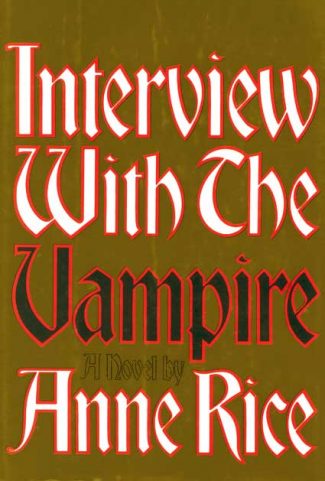By ANNE RICE (Alfred A. Knopf; 1976)
This iconic bestseller is perhaps the key vampire novel of our time. The first entry in Anne Rice’s multi-volume Vampire Chronicles (whose successive entries are increasingly unreadable), its portrayal of angst-ridden bisexual vampires was quite radical back in 1976. The novel actually retained its freshness into the mid-1980s, when I first read it (unaware of two similarly themed follow-ups, THE REVENANTS by Geoffrey Farrington and THE DELICATE DEPENDENCY by Michael Talbot, that outdid Rice’s novel, as well as the previously published DRACULA TAPE by Fred Saberhagen, which is widely believed to have influenced Rice). Rereading INTERVIEW WITH THE VAMPIRE all these years later (in light of the famed 1994 movie adaptation), I’ll confess I found it dull, overwrought and not nearly as unique as it once seemed.
This iconic bestseller is perhaps the key vampire novel of our time.
As the title indicates, the novel is related in the form of a lengthy interview, conducted by a naive young reporter, with Louis, a highly cultured vampire. Louis relates how he was vampirized on his Louisiana plantation two hundred years earlier by the haughty and self-absorbed Lestat. The latter showed Louis how to live as a vampire, sleeping in coffins at night and surreptitiously killing people and draining their blood, a lifestyle the morally upstanding Louis was slow to adapt to.
This freaky duo is joined by Claudia, a five-year-old vampirized by Lestat, who uses the girl as a pawn to keep Louis around. She comes to resent Lestat, and Claudia and Louis attempt to eradicate him and flee to Paris. There they meet the vampire Armand, who lords over a gaggle of vamps who convene at the aptly named Theatre des Vampires. Lestat, however, is still extant, and turns up at the Theatre to make further trouble for Louis, Claudia and Madeleine—a vampirized doll-maker who briefly takes Lestat’s place as Louis and Claudia’s companion-in-immortality. Not to give anything away, but everyone involved winds up highly unsettled, if not dead.
Anne Rice deserves credit for what was, again, quite an audacious account for its time.
Anne Rice deserves credit for what was, again, quite an audacious account for its time, but Louis’ relentlessly angsty, naval-gazing bent is plain annoying. Every page, you can be sure, contains one or more lengthy philosophical ruminations, related in clunky, indigestible blocks of text that do most certainly compromise the narrative momentum. Before long I wished Louis and his companions would quit debating the morality of their actions and simply drink some blood already.
See Also: Interview with the Vampire (Film)

